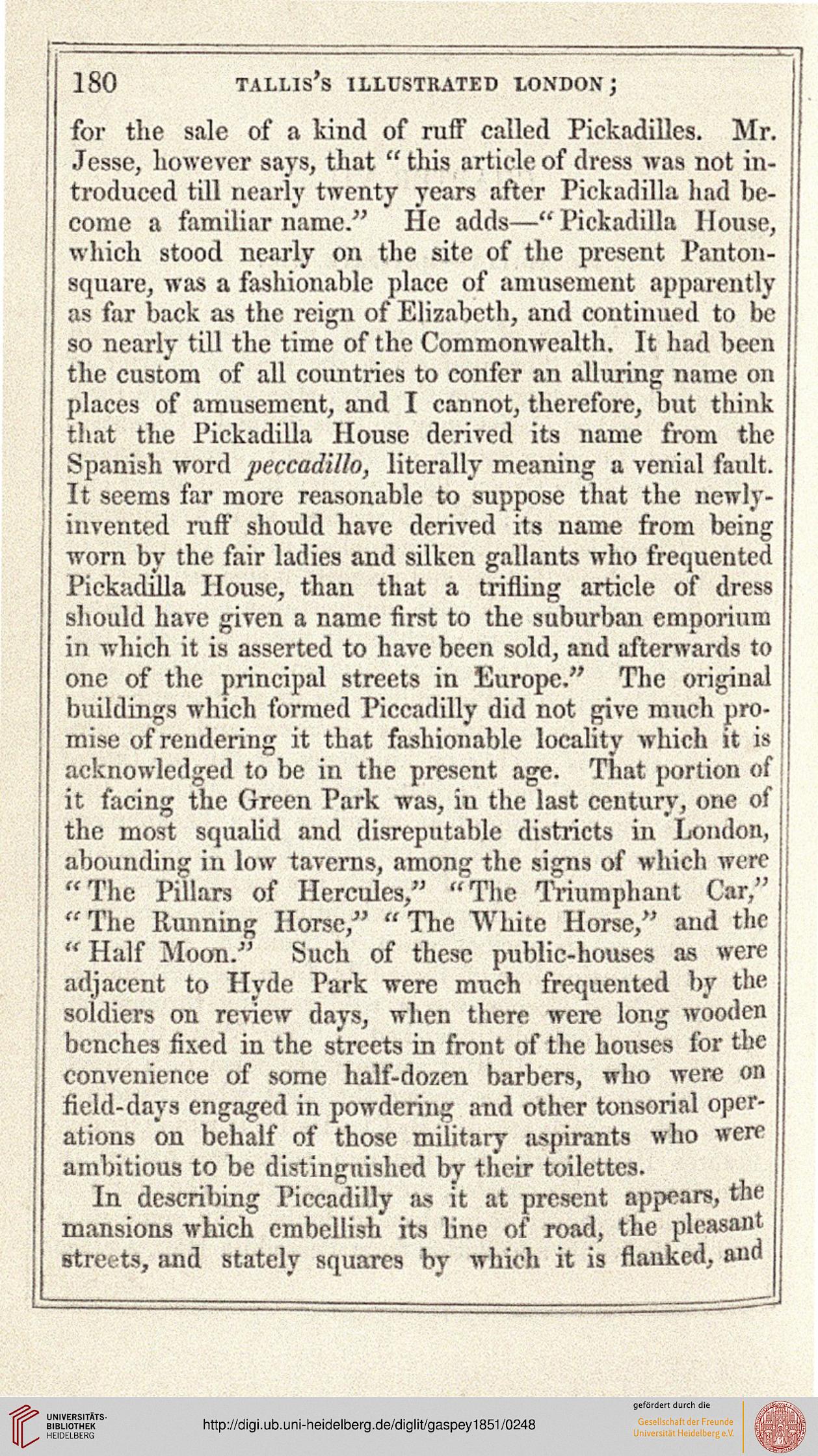180 TALLIs's ILLUSTRATED LONDON;
for the sale of a kind of ruff called Piekadilles. Mr.
Jesse, however says, that " this article of dress was not in-
troduced till nearly twenty years after Pickadilla had be-
come a familiar name." He adds—"Pickadilla House,
which stood nearly on the site of the present Panton-
square, was a fashionable place of amusement apparently
as far back as the reign of Elizabeth, and continued to be
so nearly till the time of the Commonwealth. It hod been
the custom of all countries to confer an alluring name on
places of amusement, and I cannot, therefore, but think
that the Pickadilla House derived its name from the
Spanish word peccadillo, literally meaning a venial fault.
It seems far more reasonable to suppose that the newly-
invented rnfi' should have derived its name from being
worn by the fair ladies and silken gallants who frequented
Pickadilla House, than that a trifling article of dress
should have given a name first to the suburban emporium
in which it is asserted to have been sold, and afterwards to
one of the principal streets in Europe." The original
buildings which formed Piccadilly did not give much pro-
mise of rendering it that fashionable locality which it is
acknowledged to be in the present age. That portion of
it facing the Green Park was, in the last century, one of
the most squalid and disreputable districts in London,
abounding in low taverns, among the signs of which were
"The Pillars of Hercules," "The Triumphant Car,"
" The Running Horse,-" " The White Horse," and the
" Half Moon." Such of these public-houses as were
adjacent to Hyde Park were much frequented by the
soldiers on review days, when there were long wooden
benches fixed in the streets in front of the houses for the
convenience of some half-dozen barbers, who were on
field-days engaged in powdering and other tonsorial oper-
ations on behalf of those military aspirants who were
ambitious to be distinguished by their toilettes.
In describing Piccadilly as it at present appears, the
mansions which embellish its line of road, the pleasant
streets, and stately squares by which it is flanked, sun
for the sale of a kind of ruff called Piekadilles. Mr.
Jesse, however says, that " this article of dress was not in-
troduced till nearly twenty years after Pickadilla had be-
come a familiar name." He adds—"Pickadilla House,
which stood nearly on the site of the present Panton-
square, was a fashionable place of amusement apparently
as far back as the reign of Elizabeth, and continued to be
so nearly till the time of the Commonwealth. It hod been
the custom of all countries to confer an alluring name on
places of amusement, and I cannot, therefore, but think
that the Pickadilla House derived its name from the
Spanish word peccadillo, literally meaning a venial fault.
It seems far more reasonable to suppose that the newly-
invented rnfi' should have derived its name from being
worn by the fair ladies and silken gallants who frequented
Pickadilla House, than that a trifling article of dress
should have given a name first to the suburban emporium
in which it is asserted to have been sold, and afterwards to
one of the principal streets in Europe." The original
buildings which formed Piccadilly did not give much pro-
mise of rendering it that fashionable locality which it is
acknowledged to be in the present age. That portion of
it facing the Green Park was, in the last century, one of
the most squalid and disreputable districts in London,
abounding in low taverns, among the signs of which were
"The Pillars of Hercules," "The Triumphant Car,"
" The Running Horse,-" " The White Horse," and the
" Half Moon." Such of these public-houses as were
adjacent to Hyde Park were much frequented by the
soldiers on review days, when there were long wooden
benches fixed in the streets in front of the houses for the
convenience of some half-dozen barbers, who were on
field-days engaged in powdering and other tonsorial oper-
ations on behalf of those military aspirants who were
ambitious to be distinguished by their toilettes.
In describing Piccadilly as it at present appears, the
mansions which embellish its line of road, the pleasant
streets, and stately squares by which it is flanked, sun




